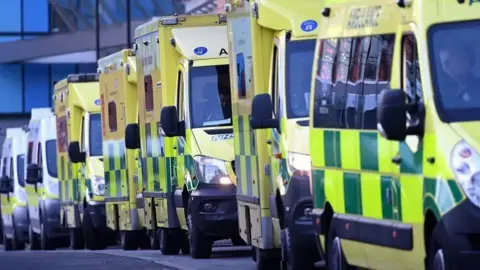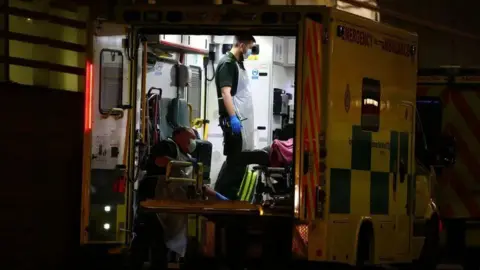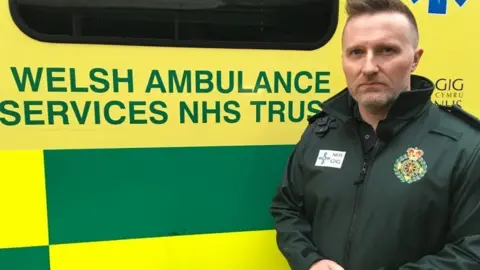Ambulance terror response fear over hospital delay
 EPA
EPAAmbulance chiefs in Wales say they may not be able to respond properly to terror attacks because of hospital handover delays.
It follows a report highlighting the risk of “catastrophic harm” to the public if crews are busy at A&E departments during major incidents.
The Welsh Ambulance Service service raised concerns after a mass-casualty simulation found it would have failed to provide an adequate response three out of four times.
The Welsh government said it expected health boards to prioritise cutting handover delays.
The tests were conducted after the Manchester Arena bombing public inquiry.
That found a host of failings by emergency services in the attack's aftermath.
The warning follows the service's claims some medics could not to respond to an explosion at Treforest Industrial Estate, in Rhondda Cynon Taf, in December 2023 because they were stuck outside Morriston Hospital, Swansea.
A major incident was declared after the blast in which a woman died.
Next week a report will be given to the ambulance service board alleging hospital officials failed to release crews from the hospital site.
Swansea Bay University Health Board denied this, saying ambulances were freed.
The ambulance service has questioned the effectiveness of release procedures.
Chief executive Jason Killens has written to Welsh health boards for assurances.
 GETTY IMAGES
GETTY IMAGESThe ambulance report said if a major incident was declared there was a risk an "effective, timely, or safe response" may not happen.
“(This would result in) catastrophic harm (death) and a breach of the trust’s legal obligation," it said.
The main reason for this was "lost capacity due to hospital handover delays", over which, it said, it had no control.
It added it was not assured hospitals had plans to release ambulances effectively.
Welsh Ambulance Service operations chief Lee Brooks said it had plans to deliver an effective response to major incidents.
He recognised handover delays were a problem.
“Our ability to send a large-scale response to an incident may be hindered if our people and vehicles are not immediately released by emergency departments," Mr Brooks said.
The report also highlighted two other occasions where the service had been concerned about ambulances not being released.
These included a fire on a ferry off Fishguard Dock in February 2023 and a gas explosion in Swansea the month after.
Swansea Bay health board said it took its responsibilities seriously and had major incident plans.

“These include agreed protocols to enable the rapid release of ambulances from the emergency department in the event that a major incident is declared," it said.
“We can confirm that on the evening of the Treforest Industrial Estate fire our major incident plan was invoked and that we did release ambulances.”
Handover delays were raised in the Senedd last week after the health committee was told ambulance crews often see only one patient a shift.
Mr Killens said as much as 30,000 hours were lost monthly in Wales due to waiting to transfer patients to hospital.
Patient safety was at risk, he said, with handover times averaging more than two hours. The target is 15 minutes.
The Welsh government said it expected health boards to cut patient handover delays as a priority over the next six months.
It said this year it was investing an extra £180m to help health boards and regional partnership boards manage more people in the community and avoid ambulances and hospital admission.
